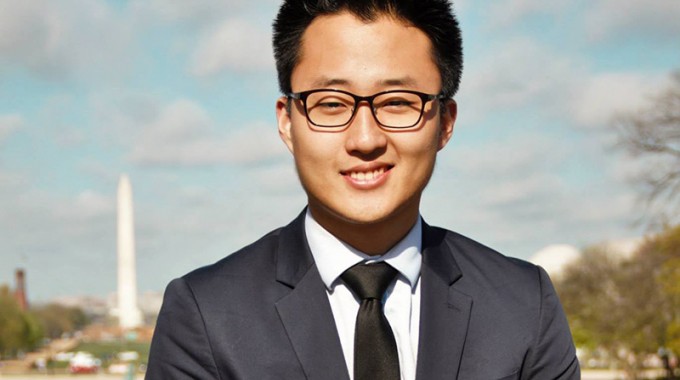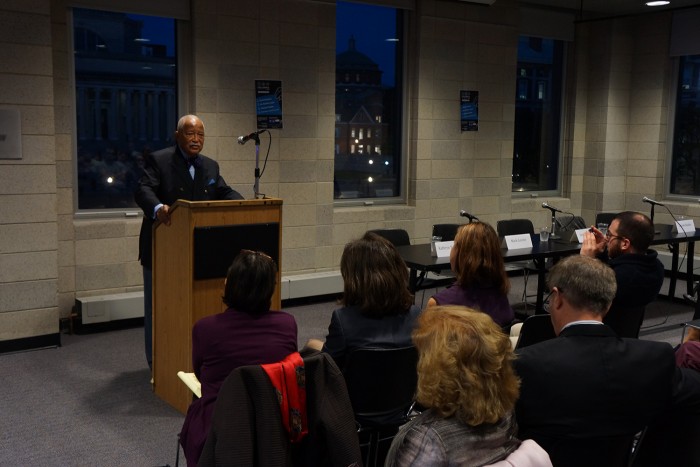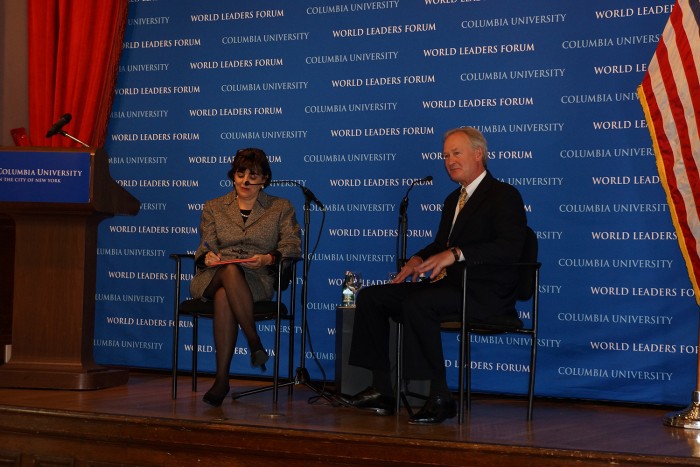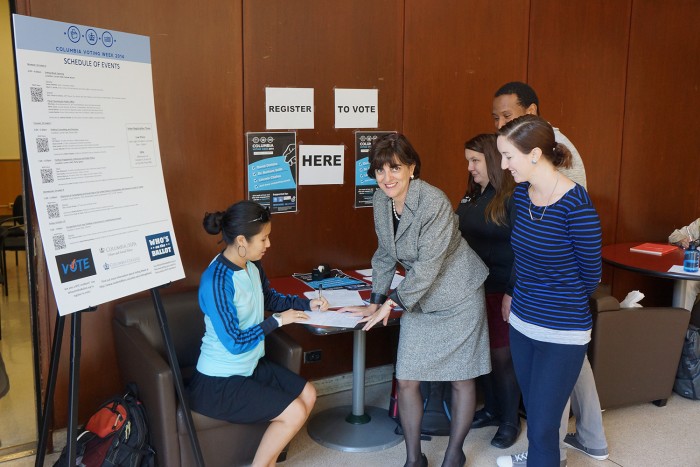If you know of a Columbia College student, faculty member, alumnus/alumna or program we should spotlight, or if you would like to submit a story, please contact:
Columbia College
Office of Communications
cc-comms@columbia.edu

“I hope that Voting Week will outlive my time at Columbia, ... making voting important in the minds of young Americans regardless of political inclination.” — David Kang CC’15
In October 2014, David Kang CC’15 created and coordinated Voting Week, five days of speakers and events centered around civic engagement and community involvement with the overarching goal of encouraging students, regardless of political inclination, to vote. With speakers including former Mayor of New York City and SIPA Professor of Professional Practice David Dinkins and former Deputy Prime Minister of Iraq Barham Salih, Voting Week also successfully secured 500 new voter registrations and absentee ballot requests. Here, David reflects on his experience working on Voting Week and the hopes he has for its future impact.
I transferred to Columbia as a sophomore from the Richard Stockton College of New Jersey, knowing little about Columbia’s political atmosphere. I had already developed an interest in politics, having run my first campaign as a student senator at my previous college. When I arrived at Columbia, my extracurricular and academic choices – student groups like the Columbia University Democrats and the Columbia Political Union and my American political science courses – reinforced my passion for politics. As I learned more about my Columbia classmates’ interests and the national trends in youth voting, my casual curiosity became a full-time commitment to civic engagement and a passion for getting out the vote.
 Former Mayor of New York City and SIPA Professor of Professional Practice David Dinkins makes the inaugural Voting Week address. Photo: Kevin Gully
My goal became to empower a marginalized voting bloc: college students, a group frequently ignored by media and politicians. Many politicians provide lip service to the burgeoning problems of the American youth — like student loans and dwindling job markets — without providing substantive or sustainable solutions. And with youth voter turnout so low — approximately 21.5 percent in 2014 — there’s just no reason for elected officials to care.
Former Mayor of New York City and SIPA Professor of Professional Practice David Dinkins makes the inaugural Voting Week address. Photo: Kevin Gully
My goal became to empower a marginalized voting bloc: college students, a group frequently ignored by media and politicians. Many politicians provide lip service to the burgeoning problems of the American youth — like student loans and dwindling job markets — without providing substantive or sustainable solutions. And with youth voter turnout so low — approximately 21.5 percent in 2014 — there’s just no reason for elected officials to care.
But from my involvement on campus, I knew that Columbia students want to make a difference in their peer groups and in their communities. Columbia’s many engaged students are a testament to the fact that members of our generation are tired of the status quo, even if they’re not necessarily conscientious voters. For instance, on the CU Democrats campaign trip to Portland, Maine, nearly 60 students (including myself) took a bus to canvass in the cold November weather to make an imprint on the Maine gubernatorial race. But upon speaking with some of the Columbia students on the trip, I discovered that many of them had not submitted an absentee ballot in their own local elections. This was a bit troubling for me and I asked myself, how can one become a community leader back home without acknowledging the political dynamics and elected officials in that community?
 Ester Fuchs, professor of international and public affairs at SIPA, with Rhode Island Governor Lincoln Chafee at an event jointly sponsored by Voting Week, the Department of Policial Science and the World Leaders Forum. Photo: Kevin Gully
Ester Fuchs, professor of international and public affairs at SIPA, with Rhode Island Governor Lincoln Chafee at an event jointly sponsored by Voting Week, the Department of Policial Science and the World Leaders Forum. Photo: Kevin Gully
After some reflection, I resolved to encourage students to translate their passionate desire for change into real power through voting. I wanted to show them that voting is an integral part of community engagement; that the youth vote can make a tangible difference in politics in all levels of government; and thus that Columbia students who are involved in their communities and interested in becoming world leaders should be invested in voting. I wanted to create a voting tradition at Columbia that complements our strong and storied tradition of political activism. And so I came up with the idea of a “Voting Week”: a week dedicated to civic engagement.
My model for Voting Week was the Columbia University World Leaders Forum, an event series aimed at advancing dialogue on the large economic, political and social questions of our time. Thanks to University President Lee C. Bollinger’s dedication to global engagement, the University has hosted speaking engagements by heads of state from around the world for more than a decade. I wanted to extend that concept to bring influential people in the United States to speak on campus. But, unlike the Forum, I wanted to focus on civic engagement as one consistent theme.
The planning and implementation of Voting Week began in the winter of my junior year at Columbia College, when I found out that Rhode Island Governor Lincoln Chafee was slated to speak the following October through the Department of Political Science. I thought Gov. Chafee’s presentation could be a great catalyst for a unique civic engagement speaker series that could spread the word about voting and inspire my peers.
 Brit Byrd CC'15 asks a question at a panel event during Voting Week. Photo: Kevin Gully
Brit Byrd CC'15 asks a question at a panel event during Voting Week. Photo: Kevin Gully
I secured funding from Undergraduate Student Life; SIPA; Columbia College Academic Affairs; and the School of General Studies. Ester Fuchs, professor of international and public affairs at the School of International and Public Affairs, helped me book speakers, including former Mayor of New York City and SIPA Professor of Professional Practice David Dinkins; former Deputy Prime Minister of Iraq Barham Salih; New York City Councilman Mark Levine; and New York State Assemblywoman Nily Rozic.
I enlisted the support of the Columbia University Democrats; the Columbia University College Republicans; the Columbia Political Union; the Political Science Students Association; the Asian American Alliance; the Roosevelt Institute; and several students from SIPA, a varied coalition that I hoped would give the Columbia student body a chance to pick and choose events hosted by a mix of constituencies that catered to different political interests.
In the end, Voting Week was held October 6-10 and was a huge success. We held 10 events on topics ranging from “Running for Public Office” to “Voting Rights in the Asian Pacific Islander Community” to “Perspectives from Iraq: Building a Democracy in a Multicultural Society,” as well as an art show, “Check: The Relationship of Art and Politics.” More than 500 students attended our offerings throughout the week and student volunteers helped secure 500 new voter registrations and absentee ballot requests.
 Ester Fuchs, professor of international and public affairs at SIPA, directs a group of SIPA students at one of the three voter registration tables set up by Voting Week organizers. Photo: Kevin Gully
Ester Fuchs, professor of international and public affairs at SIPA, directs a group of SIPA students at one of the three voter registration tables set up by Voting Week organizers. Photo: Kevin Gully
For me, Voting Week became the embodiment of everything that I had been involved in at Columbia. Not only was Voting Week the culmination of my undergraduate years as a political science major, but it was also the culmination of my time as a student leader in Columbia's political organizations. As such, I dedicated my senior thesis to Voting Week, describing the ways in which my academic interests intersected with my extracurricular efforts to mobilize students outside the classroom.
Voting Week could not have been accomplished without extensive collaborations with administrators across schools and offices, a process that proved to me that when students and administrators work in tandem, the possibilities of making a better Columbia are limitless. Ultimately, assembling a talented group of administrators, co-workers, friends and peers that I have come to know during my time at Columbia, all for the sake of forming a united vision for civic engagement, has been one of the highlights of my time here at this university.
I hope that Voting Week will outlive my time at Columbia, returning as an annual tradition, influencing students far beyond my graduation, making voting important in the minds of young Americans regardless of political inclination, and inspiring future generations of Columbians to get out the vote.
David Kang CC’15 is interested in politics, law and government. He was the lead organizer and founder of Columbia Voting Week and has held executive positions on the CU Democrats, the Political Science Students Association and the Columbia Political Union. Upon finishing school with departmental honors and cum laude honors with a B.A. in political science, David will be working at the Antitrust Division of the Justice Department after graduating.